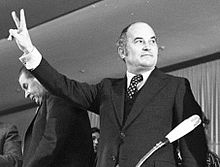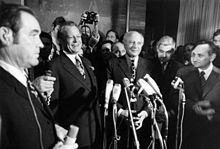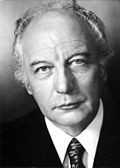1972 West German federal election
| |||||||||||||||||||||||||||||||||||||||||
All 496 seats in the Bundestag[a] 249 seats needed for a majority | |||||||||||||||||||||||||||||||||||||||||
|---|---|---|---|---|---|---|---|---|---|---|---|---|---|---|---|---|---|---|---|---|---|---|---|---|---|---|---|---|---|---|---|---|---|---|---|---|---|---|---|---|---|
| Registered | 41,446,302 ( | ||||||||||||||||||||||||||||||||||||||||
| Turnout | 91.1% ( | ||||||||||||||||||||||||||||||||||||||||
| |||||||||||||||||||||||||||||||||||||||||
 | |||||||||||||||||||||||||||||||||||||||||
| |||||||||||||||||||||||||||||||||||||||||
| This article is part of a series on the |
| Politics of Germany |
|---|
 |
Federal elections were held in West Germany on 19 November 1972 to elect the members of the 7th Bundestag. In the first snap elections since the resumption of democratic elections in 1949, the Social Democratic Party became the largest party in parliament for the first time since 1930, winning 230 of the 496 seats. The coalition with the Free Democratic Party was resumed.
Campaign
The Social-liberal coalition of SPD and FDP had lost its majority after several Bundestag MPs (like former FDP ministers Erich Mende and Heinz Starke or SPD partisan Herbert Hupka) had left their party and become members of the CDU/CSU opposition to protest against Chancellor Willy Brandt's Neue Ostpolitik, especially against the de facto recognition of the Oder-Neisse line by the 1970 Treaty of Warsaw.[citation needed]

On 27 April 1972 the opposition had tried to have CDU leader Rainer Barzel elected new chancellor in a constructive vote of no confidence, but Barzel surprisingly missed the majority of 249 by two votes. Rumours that at least one member of the CDU/CSU faction had been paid by the East German Stasi to abstain (in effect, voting against Barzel) were confirmed by Markus Wolf, former head of the Hauptverwaltung Aufklärung, in 1997.[citation needed] Nevertheless, the following budget debates revealed that the government's majority was lost and only the upcoming organisation of the 1972 Summer Olympics in Munich delayed the arrangement of new elections. On 22 September 1972 Chancellor Brandt asked for a vote of confidence, which required the same majority of 249 "yes" votes: it failed with 233 "yes" votes to 246 "no" votes. The members of the government did not participate (in effect, voting no) to ensure the vote would fail, however it would have regardless. This allowed Brandt to advise President Gustav Heinemann to dissolve the Bundestag and call new elections the same day.[1]
In the tense campaign, the CDU/CSU attacked Brandt as being too lenient towards Eastern Europe and having the wrong ideas on the economy. SPD and FDP benefited from the enormous personal popularity of the chancellor, laureate of the 1971 Nobel Peace Prize. He gained the support by numerous celebrities of the West German culture and media scene (e.g. Günter Grass), expressed by the slogan Willy wählen! ("Vote for Willy!").[citation needed]
Opinion polls
| Polling firm | Fieldwork date | Sample size |
Union | SPD | FDP | NPD | Others | Abstention | Lead |
|---|---|---|---|---|---|---|---|---|---|
| 1972 federal election | 19 Nov 1972 | – | 44.9 | 45.8 | 8.4 | 0.6 | 0.4 | 8.9 | 0.9 |
| Allensbach | 1–7 Nov 1972 | ? | 46.5 | 45.7 | 6.1 | — | 1.7 | — | 0.8 |
| Allensbach | 1–7 Oct 1972 | ? | 45.0 | 46.0 | 6.0 | — | 3.0 | — | 1 |
| Emnid for SPIEGEL | Feb 1971 | N/A | 39 | 33 | 5 | — | 23 | 6 | |
| 1969 federal election | 19 Nov 1972 | – | 46.1 | 42.7 | 5.8 | 4.3 | 1.2 | 13.3 | 3.4 |
Results
Voter turnout was 91.1%, the highest ever since 1949. In 1970 the voting age had been lowered from 21 to 18.
 | ||||||||||||
|---|---|---|---|---|---|---|---|---|---|---|---|---|
| Party | Party-list | Constituency | Seats | |||||||||
| Votes | % | Seats | Votes | % | Seats | Elected | West Berlin | Total | +/– | |||
| Social Democratic Party | 17,175,169 | 45.85 | 78 | 18,228,239 | 48.86 | 152 | 230 | 12 | 242 | +5 | ||
| Christian Democratic Union | 13,190,837 | 35.21 | 112 | 13,304,813 | 35.67 | 65 | 177 | 9 | 186 | –15 | ||
| Christian Social Union | 3,615,183 | 9.65 | 17 | 3,620,625 | 9.71 | 31 | 48 | 0 | 48 | –1 | ||
| Free Democratic Party | 3,129,982 | 8.36 | 41 | 1,790,513 | 4.80 | 0 | 41 | 1 | 42 | +11 | ||
| National Democratic Party | 207,465 | 0.55 | 0 | 194,389 | 0.52 | 0 | 0 | 0 | 0 | 0 | ||
| German Communist Party | 113,891 | 0.30 | 0 | 146,258 | 0.39 | 0 | 0 | 0 | 0 | New | ||
| European Federalist Party | 24,057 | 0.06 | 0 | 7,581 | 0.02 | 0 | 0 | 0 | 0 | 0 | ||
| Free Social Union | 3,166 | 0.01 | 0 | 1,864 | 0.00 | 0 | 0 | 0 | 0 | 0 | ||
| Independents and voter groups | 9,497 | 0.03 | 0 | 0 | 0 | 0 | 0 | |||||
| Total | 37,459,750 | 100.00 | 248 | 37,303,779 | 100.00 | 248 | 496 | 22 | 518 | 0 | ||
| Valid votes | 37,459,750 | 99.20 | 37,303,779 | 98.79 | ||||||||
| Invalid/blank votes | 301,839 | 0.80 | 457,810 | 1.21 | ||||||||
| Total votes | 37,761,589 | 100.00 | 37,761,589 | 100.00 | ||||||||
| Registered voters/turnout | 41,446,302 | 91.11 | 41,446,302 | 91.11 | ||||||||
| Source: Bundeswahlleiter | ||||||||||||
The SPD celebrated their best result ever, representing the largest faction in the German parliament for the first time since the 1930 Reichstag elections. It enabled the party to nominate Annemarie Renger for President of the Bundestag; she was the first Social Democrat and also the first woman to hold this office.
Results by state
Constituency seats
| State | Total seats |
Seats won | ||
|---|---|---|---|---|
| SPD | CDU | CSU | ||
| Baden-Württemberg | 36 | 12 | 24 | |
| Bavaria | 44 | 13 | 31 | |
| Bremen | 3 | 3 | ||
| Hamburg | 8 | 8 | ||
| Hesse | 22 | 20 | 2 | |
| Lower Saxony | 30 | 23 | 7 | |
| North Rhine-Westphalia | 73 | 52 | 21 | |
| Rhineland-Palatinate | 16 | 9 | 7 | |
| Saarland | 5 | 3 | 2 | |
| Schleswig-Holstein | 11 | 9 | 2 | |
| Total | 248 | 152 | 65 | 31 |
List seats
| State | Total seats |
Seats won | |||
|---|---|---|---|---|---|
| CDU | SPD | FDP | CSU | ||
| Baden-Württemberg | 36 | 12 | 16 | 8 | |
| Bavaria | 42 | 20 | 5 | 17 | |
| Bremen | 1 | 1 | |||
| Hamburg | 8 | 5 | 1 | 2 | |
| Hesse | 25 | 17 | 3 | 5 | |
| Lower Saxony | 32 | 20 | 7 | 5 | |
| North Rhine-Westphalia | 75 | 40 | 23 | 12 | |
| Rhineland-Palatinate | 15 | 8 | 5 | 2 | |
| Saarland | 3 | 2 | 1 | ||
| Schleswig-Holstein | 11 | 7 | 2 | 2 | |
| Total | 248 | 112 | 78 | 41 | 17 |
Post-election

On 14 December 1972 the Bundestag MPs of the social-liberal coalition re-elected Willy Brandt chancellor. His Cabinet Brandt II returned to government the next day, again with FDP chairman Walter Scheel as vice-chancellor and foreign minister. Defeated Rainer Barzel resigned as CDU chairman on 9 May 1973; he was succeeded by Helmut Kohl.
On 7 May 1974, Brandt would resign in the course of the Guillaume Affair, after one of his personal aides had been unmasked as a Stasi agent. The coalition continued under his party fellow Helmut Schmidt, while Brandt remained SPD chairman until 1987.
Further reading
- Baker, Kendall L.; Norpoth, Helmut (1981). "Candidates on Television: The 1972 Electoral Debates in West Germany". Public Opinion Quarterly. 45 (3): 329–345. doi:10.1086/268668. JSTOR 2748609.
Notes
- ^ As well as the 22 non-voting delegates for West Berlin, elected by the West Berlin Legislature.
- ^ As well as 12 non-voting delegates for West Berlin.
- ^ As well as 9 non-voting delegates for West Berlin.
- ^ As well as 1 non-voting delegate for West Berlin.
References
- ^ "Wahl des deutschen Bundeskanzlers – Kanzlerwahl". Wahlrecht.de (in German).



